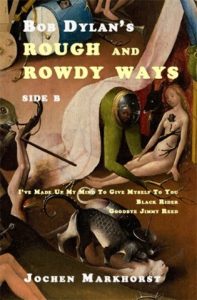 “So much beauty, so little time,” my grandmother used to sigh, standing in front of her record cabinet. And mind you, she only had one single Dylan record (Greatest Hits) – Rough And Rowdy Ways she did not live to hear.
“So much beauty, so little time,” my grandmother used to sigh, standing in front of her record cabinet. And mind you, she only had one single Dylan record (Greatest Hits) – Rough And Rowdy Ways she did not live to hear.
“Key West”, “My Own Version of You”, “Murder Most Foul”… the songs of Rough And Rowdy Ways are bulging treasure troves. A book on the album would become an even thicker paving stone than Mixing Up The Medicine, so I chose to just chop it up into manageable chunks. Following I Contain Multitudes and Crossing The Rubicon we now have: Rough And Rowdy Ways – Side B. About the three songs on Side B; “I’ve Made Up My Mind To Give Myself To You”, “Black Rider” and “Goodbye Jimmy Reed”.
It’s an album that just keeps on giving.
——————–
Goodbye Jimmy Reed (2020) part 9
by Jochen Markhorst
IX She’s going to play you for a fool
Transparent woman in a transparent dress It suits you well - I must confess I’ll break open your grapes I’ll suck out the juice I need you like my head needs a noose Goodbye Jimmy Reed, goodbye and so long I thought I could resist her but I was so wrong
 “Desire fades but traffic goes on forever,” Dylan writes, concluding his reverie on Ray Charles’ “I Got A Woman” (The Philosophy Of Modern Song, Chapter 26). It is a somewhat fatalistic aphorism, illustrating the truth of the time-honoured, proverbial “the chase is better than the catch”; life is so much more exciting when desire is still flaming – “In the beginning he drove recklessly, desire rolling him through stop signs, ” as the first-person from this short story remembers wistfully. He should, we may conclude, not have longed for a woman he could catch. But for an unapproachable, fatal woman. One like the lady from “She Belongs To Me” or “Temporary Like Achilles”, a maneater, a killer queen, a dirty Diana. Or like the archetype pur sang:
“Desire fades but traffic goes on forever,” Dylan writes, concluding his reverie on Ray Charles’ “I Got A Woman” (The Philosophy Of Modern Song, Chapter 26). It is a somewhat fatalistic aphorism, illustrating the truth of the time-honoured, proverbial “the chase is better than the catch”; life is so much more exciting when desire is still flaming – “In the beginning he drove recklessly, desire rolling him through stop signs, ” as the first-person from this short story remembers wistfully. He should, we may conclude, not have longed for a woman he could catch. But for an unapproachable, fatal woman. One like the lady from “She Belongs To Me” or “Temporary Like Achilles”, a maneater, a killer queen, a dirty Diana. Or like the archetype pur sang:
You're written in her book You're number thirty-seven, have a look She's going to smile to make you frown, what a clown Little boy, she's from the street Before you start, you're already beat She's going to play you for a fool, yes it's true
… Velvet Undergrounds “Femme Fatale”, Lou Reed’s not very subtle ballad about Edie Sedgwick, allegedly.
The fifth verse of “Goodbye Jimmy Reed” is an interlude in which the narrator sketchily articulates an obsession with a fatal woman, vaguely spiced up with a hint of a love triangle. At least, the poet does suggest a tension by contrasting a present, attainable and transparent lady (“you”) with an absent, irresistible woman (“her”). Why Dylan’s stream of consciousness ripples here is – of course – impossible to trace, but Jimmy Reed’s discography seems an obvious igniter. “Shame, Shame, Shame”, “Baby What You Want Me To Do”, “Ain’t That Lovin’ You Baby?”, “My Bitter Seed”, “Honest I Do”… the femme fatale is a regular in Jimmy’s repertoire, indeed. As in the template for Dylan’s song as well, in “Down In Virginia”:
I went down in Virginia, honey, where the green grass grows I tried to tell myself, you didn't want me no more I told my baby, "Honey, stop doin' me wrong! Why don't you pack your clothes, and bring your fine self home?" Shut up, girl, you know you doing me wrong
Thematically, Dylan may adopt the archetype for this fifth verse, but the elaboration is a bit more elegant than the average elaboration with Jimmy Reed, Robert Johnson (“From Four Till Late”, “Little Queen Of Spades”, “Love In Vain”, “Milkcow’s Calf Blues)” or Tampa Red (“Dangerous Woman Blues”, “It’s Low Down Shame”, “Georgia Hound Blues”), songs in which the narrator’s complaint goes hardly any deeper than being hopelessly smitten with an evil woman, articulated in varying degrees of helpless aggression, imagery and despair.
In the other genres – country, rock ‘n’ roll – in which the archetype is presented, the portrayal is usually not much more refined either, but Dylan has, as we all know, slightly more poetic skills and talents. Transparent woman in a transparent dress / It suits you well – I must confess is at any rate a much more elegantly worded variant of the way the present lady’s wardrobe is usually described. Descriptions like in Big Joe Turner’s “Shake, Rattle And Roll”;
Way you wear those dresses, the sun comes shinin' through Way you wear those dresses, the sun comes shinin' through I can't believe my eyes, all that mess belongs to you
… or more so, given the identical double charge, as in Charlie Rich’s “Easy Look”
She sits there at the bar Her feelings standing bare Open as a see-through dress She always wears
… with the same mirroring of the clothing’s transparency with the transparency of the lady herself. Dylan’s choice of words, however, evokes a rather more distinguished, more civilised lady. Not some tramp at a bar or a cheap hussy on the dance floor, but rather someone like a Marlene Dietrich in her famous “illusion dress”, the dresses designed for her in the 1950s by Jean Louis, for the “Blue Angels” concert years in Las Vegas. Fantastic, embroidered dresses of soufflé chiffon encrusted with clear crystals over a flesh-coloured bodysuit of nylon, which gave the illusion that Marlene was naked. Unapproachable, however, Marlene remained – a transparent woman, like Marilyn or Cher in similar dresses, La Dietrich never was. But “it suits you well”… on that we can all agree.
Just as we will all agree on the total mismatch of Dylan’s elegant opening with the impossible, abrasive sequel: the banal, utterly inappropriate I’ll break open your grapes I’ll suck out the juice. No, no one will ever say this to La Dietrich or any other goddess in a transparent dress designed by Jean Louis. This is the lingo of Albert King, of Robert Johnson’s “Travelling Riverside Blues” (You can squeeze my lemon ’til the juice runs down my leg, the template for Led Zeppelin’s “The Lemon Song”), of Charlie Pickett and especially of the godfather of all ambiguous fruit metaphors, Bo Carter and his “Banana In Your Fruit Basket” (1931). Although Dylan seems to borrow this particular metaphor, the juicy grapes, from a distant descendant of the founding fathers, the Jamaican Mr Boombastic himself, from his 1995 Grammy-winning album, Boombastic. On that breakthrough album we hear, apart from the world hits “Boombastic” and “Why You Treat Me So Bad”, at number 12:
More expensive than a bottle of chardonnay wine Aged to perfection and so refine Every man want a taste 'cause your grapes are fine Well me love your sexy rhythm and the way it rhyme
… “Jenny”, a kind of answer song to his own hit “Oh Carolina”, and after Brecht/Weill’s “Pirate Jenny” the second Jenny that seems to have made it into a Dylan song (after 1964’s “When The Ship Comes In”, that is).
Appropriate in context, anyway; all those sung ladies with fruity body features are quite cooperative, attainable and present; fatal they are not, anyway. Still, the combination grapes/fatal woman, can be found, though in another corner of Dylan’s jukebox: in Wanda Jackson’s country repertoire;
If you had me in a mansion filled with gold If I lay at your feet my heart and my soul You'd still crave the grapes on your next door neighbor's vine 'Cause you just gotta walk on both sides of the line
… “Both Sides Of The Line”, a fairly successful hit for Wanda from March 1967 (reaching 21 in the Country Charts), from one of those mid-sixties records, in this case, You’ll Always Have My Love, with which Wanda tries to reconnect with her first love and her oldest fans, country & western, after her ferocious rock and rockabilly records. Succeeding, by the way. Still, Wanda remains of course a hard-headed woman, a thorn in the side of man.
And impossible to resist.
To be continued. Next up Goodbye Jimmy Reed part 10: Anything that sounds promising
Jochen is a regular reviewer of Dylan’s work on Untold. His books, in English, Dutch and German, are available via Amazon both in paperback and on Kindle:
- Blood on the Tracks: Dylan’s Masterpiece in Blue
- Blonde On Blonde: Bob Dylan’s mercurial masterpiece
- Where Are You Tonight? Bob Dylan’s hushed-up classic from 1978
- Desolation Row: Bob Dylan’s poetic letter from 1965
- Basement Tapes: Bob Dylan’s Summer of 1967
- Mississippi: Bob Dylan’s midlife masterpiece
- Bob Dylan’s Greatest Hits
- John Wesley Harding: Bob Dylan meets Kafka in Nashville
- Tombstone Blues b/w Jet Pilot: Dylan’s lookin’ for the fuse
- Street-Legal: Bob Dylan’s unpolished gem from 1978
- Bringing It All Back Home: Bob Dylan’s 2nd Big Bang
- Time Out Of Mind: The Rising of an Old Master
- Crossing The Rubicon: Dylan’s latter-day classic
- Nashville Skyline: Bob Dylan’s other type of music
- Nick Drake’s River Man: A very British Masterpiece
- I Contain Multitudes: Bob Dylan’s Account of the Long Strange Trip

That stanza is about Jimmy Reed’s alcoholism, a condition with which Dylan had some experience apparently. The “transparent woman in a transparent dress” is a figure for clear spirits, such as gin or vodka, in a clear glass bottle. The line about sucking out your juice equates to drinking the last drops out of the bottle. The final line, “I thought I could resist you, but I was so wrong.” makes far more sense in regard to alcohol than any woman in Jimmy Reed’s life.
That’s great, Mark,
This is a much better and a much more sensible view than my laborious puzzling to see sexual ambiguities and triangulations in this verse. Slightly confusing then is at most the inconsistency (I need you versus I could resist her), but I suppose we may attribute that to Dylan’s “usual” juggling with personal pronouns.
Merci!